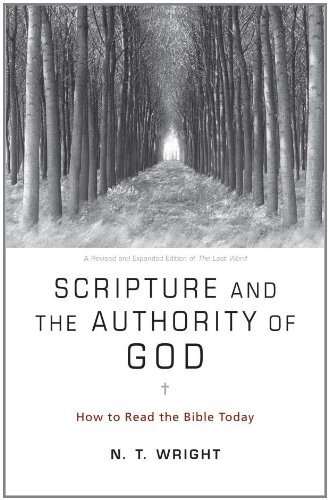Today we jump back into our series on learning to love the Bible for what it is, not what we want it to be, with a new book—Scripture and the Authority of God: How to Read the Bible Today by N.T. Wright.
This is the second book we will be discussing as part of our series. The first, The Bible Made Impossibleby Christian Smith, challenged us to rethink some of our assumptions about Scripture and address ways in which the Bible has been objectified, idolized, and misunderstood. (You can find links to all our posts on that book here.)
While the main concern in The Bible Made Impossible is solving the problem of pervasive interpretive pluralism, Wright’s goal with Scripture and the Authority of God is to address the question: how can the Bible be “authoritative?”
In the Introduction, Wright poses three questions:
1. In what sense is the Bible authoritative in the first place?
2. How can the Bible be appropriately understood and interpreted?
3. How can its authority, assuming such appropriate interpretation, be brought to bear on the church itself, let alone on the world.
These are the questions he endeavors to address in throughout the book.
However, both Smith and Wright begin with the same critical assumption—that ultimate authority belongs to the Word-Made-Flesh, Jesus Christ.
“The risen Jesus, at the end of Matthew’s gospel, does not say, ‘All authority in heaven and on earth is given to the books you are all going to write,’” notes Wright, “but ‘All authority in heaven and on earth is given to me.’”
According to Wright, the central claim of his book is that “the phrase ‘authority of scripture’ can make Christian sense only if it is a shorthand for ‘the authority of the triune God, exercised somehow through scripture.”
This is what the Bible itself teaches, says Wright.
“All authority is from God, declares Paul in relation to governments (Romans 13:1); Jesus says something very similar in John 19:11. In Matthew 28:18, the risen Jesus makes the still more striking claim that all authority in heaven and on earth has been given to him, a statement echoed elsewhere—for instance, in Philippians 2:9-11...When John declares that ‘in the beginning was the word,’ he does not reach a climax with ‘and the word was written down’ but ‘and the word became flesh.’ The letter to the Hebrews speaks glowingly of God speaking through scripture in time past, but insists thatnow, at last, God has spoken through his own son (1:1-2). Since these are themselves ‘scriptural’ statements, that means that scripture itself points—authoritatively, if it does indeed possess authority—away from itself and to the fact that final and true authority belongs to God himself, now delegated to Jesus Christ.” (p. 21-22)
And then Wright uses one of his wonderful metaphors to explain what he means.
“Slogans and clichés are often shorthand ways of making more complex statements,” he says. “In Christian theology, such phrases regularly act as ‘portable stories’—that is, ways of packing up longer narratives about God, Jesus, the church and the world, folding them away into convenient suitcases, and then carrying them about with us.” (p. 22)
A good example of this, he says, is the phrase “the atonement.”
“This phrase is rare in the Bible itself,” says Wright, “instead, we find things like ‘The Messiah died for our sins according to the scriptures’; ‘God so loved the world that he gave his only son,” and so on. But if we are to discuss the atonement, it is easier to do so with a single phrase, assumed to “contain” all these sentences, then by repeating one or more of them each time.” (p. 22-23)
“Shorthands, in other words, are useful in the same way that suitcases are. They enable us to pick up lots of complicated things and carry them around all together. But we should never forget that the point of doing so, like the point of carrying belongings in a suitcase, is that what has been packed away can then be unpacked and put to use in the new location. Too much debate about scriptural authority has had the form of people hitting one another with locked suitcases. It is time to unpack our shorthand doctrines, to lay them out and inspect them. Long years in a suitcase may have made some of the contents go moldy. They will benefit from fresh air, and perhaps a hot iron.” (p. 23)
I love this metaphor!
It applies to so many other doctrines and ideas within Christianity—doctrines and ideas that we like to carry around, and occasionally hit one another with, but rarely unpack:
Justification.
Atonement.
Inspiration.
Incarnation.
Discipleship.
Sanctification.
Justice.
Predestination.
Free Will.
Complementarianism (spelled with an “e”, people!)
Egalitarianism.
I also love the idea of unpacking all of these suitcases to see what we really mean when we use these words, for often, that is where the most important and constructive conversations can be found.
According to Wright, “When we take the phrase ‘the authority of Scripture’ out of its suitcase, then, we recognize that it can have Christian meaning only if we are referring to scripture’s authority in a delegated or mediated sense from that which God himself possesses and that which Jesus possesses as the risen Lord and Son of God, the Immanuel. It must mean, if it means anything Christian, ‘the authority of God exercised through scripture.’” (24)
This is Wright’s thesis, but it’s just the beginning of the conversation. There is much more unpacking to come, and I look forward to doing that along with you!
(Note: Our discussions will continue on Mondays. However, I’m hoping to mix in some roundtable discussions, reflections, interviews, and videos, along with the book study.)
What do you think of Wright’s thesis?
Does anyone else get a bit of a nervous tick when we talk about ‘authority’?
What are some other Christian ‘suitcases’ you would like to unpack?
© 2012 All rights reserved.
Copying and republishing this article on other Web sites without written permission is prohibited.


